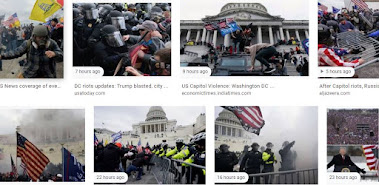Did coverage exacerbate, exaggerate unrest in DC?
Did a group of patriots descend upon America’s Bastille yesterday in an attempt to refresh our country’s liberty? Or, did terrorists storm the capitol, intent on violently overthrowing the government? Were the events of January 6, 2021 a riot? Insurrection? Were those involved a mob, or merely protesters? Was this a coup?
If yesterday demonstrated anything in terms of media, it underscored the importance of the words we use and the way we frame our stories. Carelessly chosen words can add fuel to the fire, misinform the public, and deepen partisan divides.
Just last summer, we asked similar questions about how the media were portraying Black Lives Matter (BLM) protests. On this blog site, I praised responsible coverage that highlighted the peaceful 99% of the protesters with headlines like “US at precipice as demonstrations intensify” and “Area protests against police brutality continue for third day” while ripping publications that sensationally highlighted only the violence by stating “Looters rampage across region” or “They Want Ruin.” I also wrote about how Fox News’ “deliberately distorted and demonstrably false narratives have created an atmosphere of irrational fear, a fertile ground into which seeds of disinformation have been planted on social media” (http://stevenyoungblood.blogspot.com/2020/06/).
Did the media learn any lessons from its BLM reporting? Did they accurately portray yesterday’s events in a way that did not exacerbate the situation, and in a manner consistent with peace journalism?
I was disturbed by the generalizations made by many media. Certainly, some pro-Trump protesters did engage in a riot, defined in the Associated Press (AP) Stylebook as “a wild or violent disturbance of the peace involving a group of people. The term riot suggests uncontrolled chaos and pandemonium.” But others did not disturb the peace or break the law, just like, in the BLM protests, some were peaceable, and others were not. I prefer the term “unrest,” which the AP calls “vaguer, milder and less emotional term.” (From Twitter: @APstylebook Sept. 30, 2020)
The same applies to the word “mob.” (New York Times: "Mob storms capitol...") Some engaged in mob-like behavior “bent on riotous or destructive action,” while demonstrably other protesters did not. To portray everyone present yesterday as a mob is inaccurate, just as it was last year when Fox News incessantly tarred all the BLM protesters with the label “mob.”In a Tweet, KQED (NPR-San Francisco) advised its staff to call the protesters "insurrectionists" or "pro-Trump extremists." While "insurrectionists" is better than "rioters," it still generalizes. I prefer the latter, since it correctly implies that not all Trump supporters are extremists.
I’m also concerned about the liberal use of the terms “coup” (“a sudden, violent, and illegal seizure of power from a government”) and “insurrection” (“a violent uprising against an authority or government”). I believe “coup” is technically incorrect, since power was never seized from the government. Government disruption is not seizure.
The San Francisco Chronicle’s front page today was headlined simply, “Insurrection,” while the Portland Oregonian’s said, “Unprecedented Insurrection.” “Insurrection” does more accurately describe yesterday’s events, but to my ear is needlessly judgmental regarding the intent of all of the protesters. Some planned violence; others didn't.
If we don’t call it a coup or insurrection, what was it? It was a futile, desperate attempt by the misinformed and misled to have their voices heard. It was a protest that became violent. Using “coup” and “insurrection” sensationalized and exaggerated the day’s events. If there was a legitimate, reasonable danger of the United States government being overthrown, then maybe these words apply. But was that really the case yesterday?
In my book “Peace Journalism Principles and Practices,” I present seven principles on how to more responsibly report civic unrest. These are shown below, with my capitol unrest comments in parenthesis:
1. Report on “them” fairly, respectfully, and with empathy. (Were peaceful pro-Trump protesters mocked? Were their voices heard?)
2. Report about the invisible causes and effects of the unrest. (Trump did incite. But what other less proximate factors led to yesterday’s violence?)
3. Use precise and objective language (It was not a coup)
4. Report proactively to facilitate dialogues before violence occurs (How much reporting about this protest was made beforehand?)
5. Report counter-narratives that provide a different perspective on the protesters, the police, and the community (Profiles of protesters, capitol police, etc.)
6. Report with reconciliation in mind (Where can we go from here? How can we bring these protesters back into society? How do we heal?)
7. Give voice to peacemakers on all sides during and after the unrest (Were there protesters who attempted to head off or end the violence?)
I’d like to see media use these principles, make a more consistent effort to reject sensational framing and language, and instead work to de-escalate, or at least not exacerbate, civic unrest.


No comments:
Post a Comment